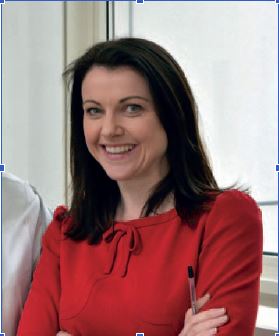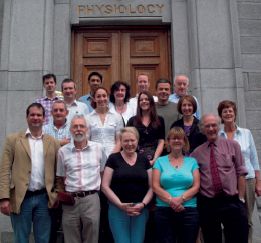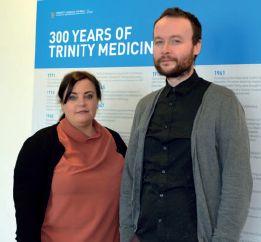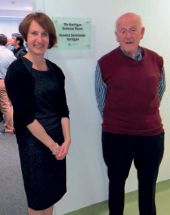
Physiology News Magazine
Physiology in Trinity College Dublin
News and Views
Physiology in Trinity College Dublin
News and Views
Áine Kelly
Head of Physiology, Trinity College Dublin, Ireland
https://doi.org/10.36866/pn.103.10

Staff and students of the Physiology Department in Trinity College Dublin are delighted to join our other Irish colleagues in welcoming delegates to the 2016 meeting of The Physiological Society in Dublin. The department was established in 1922 and is part of the School of Medicine, which celebrated its tercentenary in 2011. Ten academic staff are supported by nine technical and administrative staff to provide teaching and research training in physiology to almost one thousand undergraduate and postgraduate students. We graduate 18 students in physiology annually as part of the Trinity science degree and teach undergraduate students of medicine and allied health sciences. Our major research expertise lies in the areas of neuroscience and exercise physiology and we run taught MSc programmes in both these areas. Collectively, staff conduct research into the physiological processes underlying learning and memory, the perception of pain, improved sports performance, and the pathophysiology of conditions including Alzheimer’s disease, Parkinson’s disease, multiple sclerosis, Rett syndrome, type 2 diabetes and Duchenne muscular dystrophy.
Trinity College Dublin last hosted a full Physiological Society meeting in 2003, although we have hosted several Society-sponsored symposia since then. Of course, physiologists visited Dublin in large numbers in 2009, when our colleagues in UCD hosted the annual society meeting, and you may have visited the Trinity campus on that occasion. The intervening seven years have seen many changes in the department in Trinity; personal, physical and academic.
The most obvious recent change in the department has been a change of location. Some of you may remember the beautiful (at least from the outside) granite building, east of the rugby pitch on the main campus, that Physiology once called home. Our new base is on the second floor of the Trinity Biomedical Sciences Institute Building on Pearse Street, a couple of minutes’ walk from our old location outside the walls of the main campus.
This 10 story 35,000 m2 development was opened in 2011. It is a multidisciplinary research building housing 75 PI’s from several schools within the university. All of the preclinical training in our medical degree, including physiology, is undertaken in the building. It could be said that what we have lost in historic location we have gained in comfort. While we may feel nostalgic from time to time about our old home, nobody misses the leaky roof of the former teaching laboratory.
Despite being 10 storeys high, space could not be found for our electrophysiologists and exercise physiologists in the new building. Unfortunately, those Faraday cages and metabolic treadmills just take up too much space. After rather a lot of negotiation, an area of the Watts building on campus, just metres from our old home, was identified and refurbished for us. This location also houses the Physiology seminar room. We’re a sentimental lot here and very mindful of our history. The seminar room is named in honour of Pat Hartigan, former Head of Physiology who retired in 2001, in recognition of his long and continuing service to the discipline of physiology. We also brought evidence and symbols of our past to the new building; our library holds bound volumes of The Journal of Physiology dating back to 1908, while the portraits of our former Chairs of Physiology smile – and in some cases glare – at the viewer from the walls of our new home. With some research activity being located within the Trinity College Institute of Neuroscience, the department is split across three locations. Moving between locations to undertake teaching and research activity keeps the staff fit, if all too often exposed to the Dublin rain.
While our history and heritage is important to us, we are constantly looking toward new teaching and research horizons. The department was instrumental in developing the BSc in Human Health and Disease, a four-year honours degree in biomedical sciences that has a strong foundation in physiology. Established by Veronica Campbell in 2009 and helmed in its infancy by former staff members Neil Docherty and Sarah Harney, the programme is now in the capable hands of Eric Downer, who was recruited to this role in 2015. Despite being a very recent recruit to the department, Eric’s laboratory is well-established, where he researches the role of the immune system in the pathophysiology of multiple sclerosis.


Marina Lynch has been a cornerstone of the department since 1992. Professor of Cellular Neuroscience and member of the Royal Irish Academy, not only is she a world-leader in the area of neuroinflammation who has published over 200 papers, she is a valued advisor to students and staff alike. Indeed no fewer than four current members of the academic staff spent time as researchers in her laboratory, a testament in itself to her mentorship and guidance, not to mention the excellence of the scientific training she provides.
Veronica Campbell’s prodigious academic management and strategic skills, no doubt honed during her time as Head of Physiology (2006-2010), have been recognised by the university. She served as Dean of Graduate Studies from 2010-2013. After a far too brief two-year hiatus back in physiology, she has been nabbed by university management yet again and now holds the position of Bursar and Director of Strategic Innovation of the university. Of course, she remains an active physiologist; her research into the roles of cannabinoids in cell physiology still thrives and we look forward to welcoming her back full-time to the Department in due course. Electrophysiologist Daniel Ulrich, formerly Trinity Physiological Society representative, is presently on leave of absence. Thankfully, the university management recognised that Physiology activity is far too important to leave two academic posts vacant and we were fortunate to recruit two young physiologists, neuroimmunologist Aedin Minogue and respiratory physiologist Deirdre Edge, in September 2015 to step into the breach.
Mikel Egaña is our exercise physiology expert. He has published several key papers on the effects of exercise interventions on vascular and metabolic adaptations and exercise tolerance in type 2 diabetes, obesity and ageing. He runs the MSc in Exercise Physiology and, together with me and led by colleagues from the discipline of physiotherapy, has helped to develop an online certificate course in clinical exercise prescription. Alice Witney researches how different forms of sensory information, including cutaneous, auditory and vestibular afferents, can influence movement. She also puts incredible effort into coordinating the honours degree programme in Physiology, consistently one of the most popular choices among Trinity science students.
Kumlesh Dev brought recent industry expertise and collaboration to the Department when he joined us in 2008. A neuropharmacologist, he researches drug targets for the treatment of diseases including multiple sclerosis and Parkinson’s disease. Under his stewardship, the MSc in Neuroscience has grown from strength to strength and was awarded the accolade ‘best postgraduate science course in Ireland’ at the 2012 Postgrad Ireland awards.
Maeve Caldwell joined us from the University of Bristol in 2014. As former external examiner of our MSc in Neuroscience, she obviously liked what she saw of our department during her visits and we are delighted to have her expertise in stem cell biology as part of our research portfolio.
Sadly, we lost two cherished members of staff in recent years. Chris Bell, the most recent incumbent of the Chair of Physiology, died in 2007 in his native Australia shortly after his retirement, while the energetic, exceptional Tom Connor passed away in 2013. Their academic and personal legacies live on and they are very fondly remembered. We also remember the contributions of our recently retired staff, Roger Luckwill (2009), Alan Tuffery (2010) and Roger Anwyl (2013).
My own six-year tenure as Head of Physiology ends in July 2016 and I look forward to the opportunity to again focus my full efforts on my research into the neuroprotective effects of exercise on the brain. I hope that you will have an opportunity to visit the beautiful Trinity campus during your visit to Dublin and, together with the rest of the members of the department, wish you an enjoyable and successful visit to Dublin.

